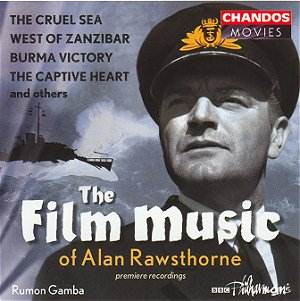THE FILM MUSIC OF ALAN RAWSTHORNE.
 BBC Philharmonic/Rumon Gamba.
BBC Philharmonic/Rumon Gamba.
 CHANDOS. CHAN 9749
CHANDOS. CHAN 9749

This representative selection of film music by Alan Rawsthorne ranges from
war epics such as The Cruel Sea and Burma Victory to melodramas
such as Uncle Silas and Saraband for Dead Lovers. However,
arguably the most memorable tracks on the CD do not come from such powerful
statements: the haunting waltz from Uncle Silas is a delight with
its Prokofiev-like shifts of key and the graceful and charming Three Dances
from "The Dancing Fleece" presage (and indeed outshine) the composer's
1955 ballet Madame Chrysanthème.
The Cruel Sea (Main titles and Nocturne) receives a brisk and forthright
performance but compared to the version by the Royal Ballet Sinfonia conducted
by Kenneth Alwyn on Silva Screen Records Ltd (FILM CD 177) the Chandos reading
is a little stiff and plain. The Alwyn version takes more time over the score,
especially the Nocturne and lavishes the music with a little more emotional
commitment. By digging deeper into the music, the Silva Screen release makes
the listener appreciate Rawsthorne's melodic and dramatic gifts even further.
The main title of Lease of Life is a moving miniature encapsulating
and rising above the film's somewhat maudlin tale of a poor, ailing priest
(played by the ailing Robert Donat) trying to get money to allow his fledgling
pianist daughter to go to music college (hence the brief burst of piano music
in the sequence). The bustling, energetic "VE Day" from The Captive
Heart and the "Carnival" music from Sarabande for Dead Lovers
are clearly from the same pen as the "Street Corner" Overture. I find these
upbeat episodes more entertaining and more revealing of Rawsthorne as a composer
and personality than the slightly impersonal "stiff upper lip" war film music
(though the Cruel Sea track contains a vivid and stark seascape).
Nonetheless, all the pieces assembled here provide a very valuable addition
to the Rawsthorne discography, complementing his more "serious" orchestral
works such as the three symphonies and the concertos and it must be said
that in some cases it is the film music which boasts the more memorable
invention!
One minor quibble - the otherwise informative and well-illustrated accompanying
booklet fails to mention the dates of the films included on this CD. They
are discussed in chronological order in the programme notes but here are
the dates of the films in the order in which they appear on the disc: The
Captive Heart (1946); West of Zanzibar (1953); The Cruel Sea (1952); Where
no Vultures Fly (1951); Uncle Silas (1947); Lease of Life (1954); The Dancing
Fleece (1950); Burma Victory (1945) and Sarabande for Dead Lovers (1948).
The playing of the BBC Philharmonic under Rumon Gamba is exemplary and the
Chandos recording is as clear and full-bodied as we have come to expect from
this source. I hope this release will turn out to be the first part of a
series of CDs devoted to the film music of Alan Rawsthorne. There are many
more fine scores yet to be released on disc, including: Broken Dykes
(1945); The Drawings of Leonardo da Vinci (1953); Floods of Fear
(1958); The Legend of the Good Beasts (1956); The Man Who Never
Was (1956); Messenger of the Mountains (1964); Pandora and
the Flying Dutchman (1951) - a surprising omission from the Chandos CD;
Port of London (1959); School for Secrets (1946); Street
Fighting (1942) and Waters of Time (1951). On the strength of
the quality of the material on display in this Chandos disc, Rumon Gamba
and his BBC forces should lose no time in mining further treasure from the
Rawsthorne film scores. Recommended to film music fans and admirers of Alan
Rawsthorne alike.
Reviewer
Paul Conway


![]()